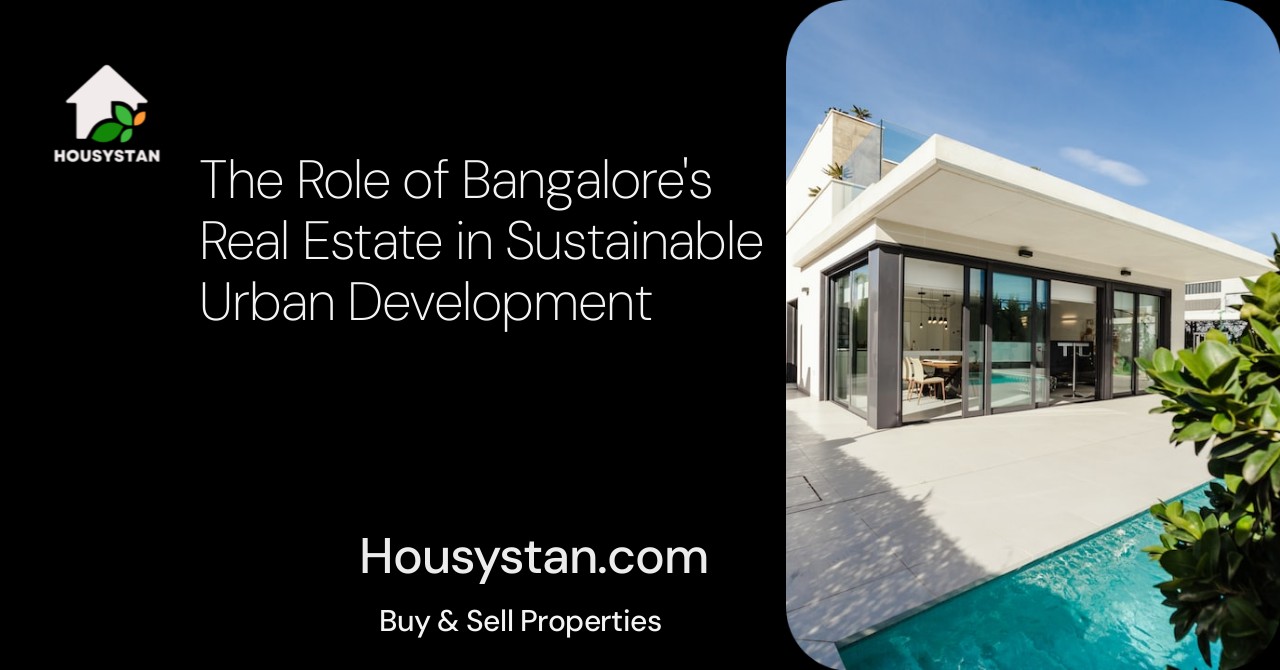The Role of Bangalore's Real Estate in Sustainable Urban Development
Read latest blogs and articles from Housystan

The Information mentioned here was last updated on:
29/1/2026The Role of Bangalore's Real Estate in Sustainable Urban Development
Bangalore, often dubbed the Silicon Valley of India, has rapidly evolved from a garden city to a bustling metropolis. This transformation has brought with it a host of challenges, chief among them being sustainable urban development. As one of India's fastest-growing cities, Bangalore faces the dual task of accommodating a rising population while ensuring that development does not come at the expense of the environment. Real estate plays a significant role in this balance.
Understanding Sustainable Urban Development
- Verified Tenants/Buyers
- Unlimited Property Listing
- Zero subscription/charges fee
Before delving into Bangalore's real estate landscape, it's essential to grasp what sustainable urban development entails. This concept revolves around meeting the needs of the present without compromising the ability of future generations to meet their own needs. It encompasses:
- Environmental Protection: Ensuring that growth does not lead to environmental degradation.
- Economic Growth: Promoting economic activities that improve living standards while preserving natural resources.
- Social Equity: Providing equitable access to resources like housing and clean air for all segments of society.
Bangalore's Real Estate Landscape
Rapid Urbanization
Bangalore's population has surged over the past few decades, driven by its booming IT industry. This influx of people has heightened demand for housing, commercial spaces, and infrastructure. As the city's boundaries expand, real estate development is crucial in accommodating this growth.
Key Areas of Growth
- Residential Hub: Neighborhoods such as Whitefield, Marathahalli, and Electronic City have seen extensive residential projects cater to the influx of IT professionals.
- Commercial Spaces: Tech parks like Manyata Tech Park and Bagmane Tech Park have spurred the development of ancillary services, including retail and hospitality.
- Infrastructure Projects: The Bangalore Metro expansion and peripheral roads are paving the way for integrated urban mobility solutions.
Challenges in Real Estate
1. Land Scarcity: Limited availability of land poses a significant challenge, leading to vertical construction and the conversion of agricultural lands.
2. Congestion and Pollution: Increased vehicular traffic has exacerbated air quality issues, requiring real estate solutions that consider the environment.
3. Affordability: The burgeoning demand for housing has led to skyrocketing prices, making it challenging for the average citizen to afford property.
Sustainable Practices in Bangalore's Real Estate
Green Building Initiatives
- LEED Certification: Developers in Bangalore are increasingly aiming for Leadership in Energy and Environmental Design (LEED) certifications, ensuring buildings meet specific green criteria.
- Energy Efficiency: Incorporating solar panels, LED lighting, and high-efficiency HVAC systems helps reduce energy consumption.
- Water Management: Rainwater harvesting and wastewater recycling are becoming standard practices in new constructions.
Smart City Solutions
Bangalore is leveraging technology to create smart, sustainable solutions in urban planning:
- Integrated Transport Systems: Real estate projects increasingly focus on connectivity to public transport to reduce reliance on private vehicles.
- IoT and Automation: Implementing Internet of Things (IoT) for energy monitoring and smart waste management systems in residential complexes.
- Public Spaces: Real estate developments are incorporating parks and green zones to enhance urban biodiversity and improve residents' quality of life.
Cross-Sector Collaborations
Collaboration between government bodies, real estate developers, and tech companies is critical in driving sustainable practices. These partnerships can foster:
- Policy Formulation: Creating regulations and incentives that promote green building and city planning standards.
- Research and Innovation: Investing in technologies that facilitate sustainable real estate development.
- Community Engagement: Involving local communities in planning to ensure developments meet residential needs without compromising the environment.
The Role of Government and Policy
The Karnataka government is instrumental in shaping the future of Bangalore's urban development. Key policy interventions include:
- Bangalore Master Plan: This initiative outlines the city's growth strategy, focusing on sustainable land use, mobility, and environmental conservation.
- Incentives for Green Buildings: Developers are encouraged to partake in sustainable practices through tax rebates and other monetary incentives.
- Affordability Initiatives: Projects under the Pradhan Mantri Awas Yojana aim to build high-quality, affordable housing for low-income groups.
Challenges Hindering Sustainable Development
Bureaucratic Hurdles
- Clearances and Approvals: Lengthy processes for building approvals can delay projects, leading developers to prioritize quick, non-sustainable approaches.
- Zoning Laws: Inconsistent application of zoning laws can lead to unplanned growth and strain on infrastructure.
Market Dynamics
- Demand-Supply Gap: Increased urban migration continuously pressures the real estate market, often prioritizing quantity over quality.
- Speculation: Real estate speculation can inflate prices, making sustainable initiatives less attractive to developers focused on quick profits.
Future Outlook for Bangalore's Real Estate
Embracing Renewable Technology
The future of Bangalore's real estate lies in more significant adoption of renewable technologies. Concepts like vertical gardens, solar-powered buildings, and electric vehicle (EV) charging infrastructure are becoming more prevalent.
Decentralized Development
Promoting growth in suburban areas and secondary cities can alleviate pressure on Bangalore's core. This approach encourages decentralized real estate developments that distribute resources more evenly and reduce urban congestion.
Access to more eco-friendly materials and innovative construction techniques will likely define Bangalore’s real estate trajectory. From using recycled materials to 3D printed homes, technological advancements are paving the way for more sustainable building practices.
Bangalore's journey to sustainable urban development is multi-faceted, with real estate playing a pivotal role. By embracing sustainability, fostering collaborations, and implementing forward-thinking policies, Bangalore can set a benchmark for other Indian cities to follow.
-
For related reads, explore our [insight on sustainable practices]() in urban areas worldwide or check out our comprehensive guide on [green technology implementation]() in city planning.